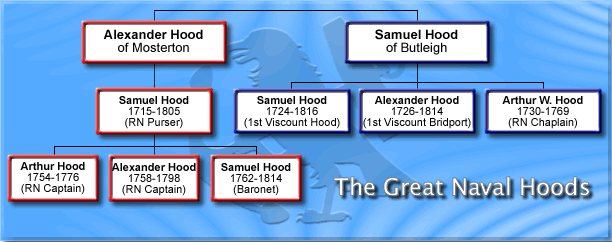
MOSTERTON & THE HOOD FAMILY
Compiled and donated to the Dorset OPC Project by Kim Parker.
Overview
Although an inland parish, Mosterton has strong naval associations through famous sons of the Hood family. During the Nelson era, two trios of brothers from successive generations of this family served and obtained high honours in the Royal Navy.
In the early eighteenth-century, Alexander Hood settled in Mosterton, while his younger brother, Samuel Hood, became vicar of Butleigh, Somerset. It was from Samuel's line that the first great naval Hoods, Samuel, 1st Viscount Hood, and Alexander, 1st Viscount Bridport, arose. A third son, Arthur William Hood, served briefly as a Royal Navy chaplain. Meanwhile, Alexander Hood of Mosterton also had a son named Samuel who joined the navy and rose to the rank of purser. Purser Samuel in turn engendered three great naval sons: Admiral Sir Samuel Hood (Baronet) and Captains Alexander and Arthur Hood.

Graphic courtesy of H.M.S. Hood Association
Other naval Hoods emerged in subsequent generations, most notably Admiral Sir Arthur William Acland Hood (1st Lord of the Admiralty, 1885-89) and Rear-Admiral Sir Horace Hood who died aboard battle cruiser Invincible at Jutland.
The name of this illustrious naval family has continued to live on in the Royal Navy through the naming of ships after them. (See http://www.hmshood.com)
Mini-Biographies of the Admirals Hood
Transcribed from notes accompanying portraits of the Hood family on display in the Admiral Hood Public House courtesy of the National Maritime Museum.
Samuel, Viscount Hood (1724-1816)
He was born son of a country parson from Butleigh near Glastonbury. His mother
was daughter of Richard Hoskins of Beaminster. Having good connections, he
rose rapidly during the wars against France and the American Colonies, becoming
a captain at 32 and an admiral at 56. From 1786, he was variously Commander
in Chief at Portsmouth, a member of the Admiralty Board, Commander in Chief
Mediterranean and Governor of Greenwich Hospital. He was rated by Nelson one
of his finest admirals, and was the greatest of the admirals Hood.
Alexander, Viscount Bridport (1726-1814)
He was Samuel's younger brother and his career was very similar. He joined
the navy in the same year and was appointed admiral also in the same year,
1780. He held a command at the Glorious First of June in 1794, and was later
Commander in Chief of the Channel fleet at the time of the Spithead Mutiny
of 1797. His final command was of the crucial 2-year long blockade of Brest,
until 1800, when he retired.
Sir Samuel Hood (1762-1814)
He was a cousin of Viscount Hood, and younger brother of the brilliant Captain
Alexander Hood (1758-1798) who died in action and never became an admiral.
Sir Samuel was a captain at 26, and served in the Mediterranean under Nelson.
He commanded H.M.S. Zealous at the Battle of the Nile in a brilliant fashion.
He then fought in the West Indies, capturing Saint Lucia and Tobago, and losing
an arm. He served in the Baltic and relieved Sir John More's Army at Corunna,
but 5 years later died prematurely of fever in the East Indies, after an exceptionally
varied and active career. He was too, the most scholarly of the admirals Hood.
Arthur, Baron Hood (1824-1901)
Born in Bath, he was a grandson of Captain
Alexander Hood. He saw an unusual amount of active service for his era, being
at the bombardment of Acre in 1836, a member of the Naval Brigade in the Crimea
and, shortly after, fighting in the China Station. After his appointment in
command of the R.N. College, Portsmouth, he became a naval administrator, conservative,
safe & typical of the senior
officers who too slowly developed the mighty Victorian navy. Promoted to flag
rank in 1879, he was Commander in Chief Channel fleet and First Sea Lord, until
his retirement in 1889, perhaps the least of the admiral Hoods.